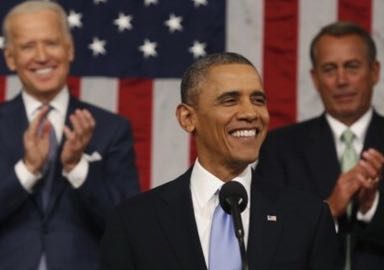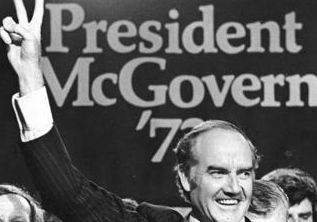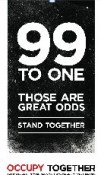Obama: Limits, freedom, and power
Written on January 21st, 2015America likes charismatic optimists. Roosevelt, Kennedy, Reagan, Clinton. That was why I favored Obama over Hilary in ‘08. And why I thought he ultimately won. America was feeling down and needed someone to help change the mood, pull the country in a new direction, get us looking forward. Obama’s speech at the 2004 convention. Si se puede. Yes we can. All charismatic optimism.

What went wrong for Obama? Turns out he wasn’t just optimistic about the Republican response to him, he was naively and ineffectively so, compromising for compromise’ sake. He seemed driven by the grand notion that he could single-handedly change Washington. Too often he ended up asking for too little and conceding too much in his confrontations with Republicans.
In the stimulus bill negotiations early in his administration, Obama gave up $40 billion in aid to the states, and got not a single Republican House vote in return. That money would have been spent immediately. It would have kept services open and workers employed, with positive ripple effects in states like California whose debts ballooned after the crash. He still had a Congressional majority. He could have sent a bill down the next day, specifically for that $40 billion to the states, and, like the initial bill, it could have passed without a single GOP vote.
America also likes winners. And people who fight for their convictions. The Democrats and Obama have been caught between their espoused principles and their Wall Street funders. The Republicans have no such conflict. They want the same things as their funders. So they go for touchdowns. Too often the Democrats and Obama are willing to stop at the 20-yard line. Americans can tell the difference.
We all know it’s a lot more complicated than that. The fanning of fear has played a huge role, as has the flood of undisclosed campaign cash. But, allow me to fast forward to last night’s State of the Union.
Obama’s party took a terrible beating in the recent election, and he is speaking for the first time to a Congress in which the GOP holds majorities in both houses. Yet he looks relaxed and confident. One of the talking heads said after the speech that for the first time she got the feeling that Obama would like a third term. Maybe, but I also got the feeling for the first time that Obama could enjoy the freedom of being president for two more years – but only two more years.
As young as he is, for as long as he lives, he will never again have this much power. Sure, he faces enormous obstacles in the form of both the numbers and the approach of his Congressional opposition. Yet, perhaps their dominance gives him even greater freedom. Why not go for what you really want, see how far you can move public opinion, and how far public opinion can move what happens – now or in 2016.
He’s laid out a vision of where we need to go. Higher minimum wages, progressive taxation and other programs to restore the middle class, especially women and children. Foreign policy that is strategic rather than impulsive, especially in the use of the military. Accelerating our response to climate change. Rebuilding our infrastructure. Continuing down the path of immigration reform.
It’s an unusual position to be in, no doubt: Structurally limited by GOP dominance of Congress and the Supreme Court, but still the most powerful man in America. What if he chooses to take full advantage of all the assets of being president – above and beyond executive power? What if, unbound by campaign calculation, he chooses to use every tool at his disposal – the bully pulpit in particular – to achieve the maximum impact? And what if he also chooses to use that power to achieve the highest good?
A guy can dream.
[photo credit: http://all-goebook.rhcloud.com]
Holiday Greetings 2012
Written on December 27th, 2012
|
Special Replay – GEORGE McGOVERN
Written on October 21st, 2012 |
May George McGovern rest –as he lived — in peace. We have lost a great and decent man.
At 24, I worked for McGovern’s 1972 Presidential effort, managing the campaign in what was then the 52nd Assembly District in Los Angeles County. This was the most conservative Democratic district in California and likely favored both Hubert Humphrey and George Wallace over the nominee. In 2005, I had the opportunity to interview him for an hour with the release of the documentary, One Bright Shining Moment: The Forgotten Summer of George McGovern.
GEORGE McGOVERN was a decorated World War II bomber pilot (his wartime exploits were at the center of of Steven Ambrose’s The Wild Blue) and professor at Dakota Wesleyan Univeristy. After running the Food for Peace Program under John Kennedy, he represented South Dakota for two terms in the House and three terms in the Senate. His opposition to the Vietnam War fueled a grassroots campaign that won him the 1972 Democratic presidential nomination, only to lose to incumbent Richard Nixon in one of the great landslides in US history. Many members of Nixon’s Committee to Re-Elect the President later served jail time for Watergate-connected crimes.
In 1997, Bill Clinton named him the US Permanent Representative to the UN’s Food and Agriculture Organization, and in 2000 Clinton awarded him the nation’s highest honor, the Medal of Freedom. He has written nine books including Terry: My Daughter’s Life and Death Struggle with Alcoholism (about his daughter — also named Terrence — who died in 1994), The Essential America: Our Founders and the Liberal Tradition, and Ending Hunger Now: A Challenge to Persons of Faith.
In Computers We Trust: The Thrill of Victory, the Agony of Defeat
Written on August 16th, 2012After a trip of a hundred million miles, the world cheered the landing August 6th of the rover Curiosity on the surface of Mars. In the 7 minutes after the ship entered our neighboring planet’s atmosphere, it sped up to 13,000 mph and then slowed to 1.7. Aiming for a target area of less than 50 square miles, the landing involved 76 pyrotechnic devices, a huge parachute, rocket thrusters, and finally a tether to drop the rover on land.

At that distance, it takes 14 minutes for a signal to reach the earth, so at the moment the team got word that the ship had entered Martian atmosphere, 7 minutes had already passed since the rover had either landed or crashed. Half a million lines of code, $2.5 billion dollars, NASA’s reputation and future funding at risk, every step of the landing pre-programmed, zero margin of error, and the result: complete and utter success.
But not all the recent news regarding our reliance on computers has been as reassuring.
The August 3rd Los Angeles Times featured these two headlines: Knight Capital trading debacle shows Wall Street frailties and Patient data outage exposes risks of electronic medical records. That’s a pretty solid one two punch. How we finance society and how we save lives are being increasingly entrusted to computer systems, presenting risks on a massive scale.
August 8th, a story appeared at wired.com and spread through the net: How Apple and Amazon Security Flaws Led to My Epic Hacking. Gmail was deleted, Twitter and ICloud compromised, hard drive wiped clean, photos and messages gone forever. This wasn’t the story of some naïve webster attacked visiting East European porn sites. No, this happened to Mat Honan, a reporter for Wired, compromised by his accounts with Apple and Amazon, two of the most trusted and successful online entities.
Knight Capital Group, a brokerage that handles nearly 11% of all stock trading in U.S. companies…lost $440 million in less than an hour — nearly four times the company’s profit last year… Knight’s software executed in a matter of minutes a series of trades that were designed to be done over a period of days. This glitch is just one of a series that have plagued Wall Street in recent years.
In the case of the medical info, we’ve been told that we must computerize our healthcare records and operations to be more efficient, effective, and cut costs. The medical field has been ridiculed for it’s continued reliance on paper.
As part of the 2009 economic stimulus, the Obama administration is spending more than $27 billion to speed the switch to computerized patient records… In 2015, the government will begin imposing financial penalties against hospitals and doctors that don’t adopt electronic health records.
Cerner Corp., a leading supplier of electronic health records to hospitals and doctors, said “human error” caused the outage July 23 [in which] …Dozens of hospitals across the country lost access to crucial electronic records for about five hours.
Many hospitals choose to outsource [electronic record keeping]… to save money or to avoid having to hire the staff required. Cerner’s revenue from remote hosting and similar services grew 20% last year.
When the computers went down last week, some hospitals lacked backup sources for critical information. A new team of doctors and nurses came on duty, and for hours were unable to read the reports of the previous shift.
Doctors and hospitals interviewed said they weren’t immediately aware of any patients harmed by the disruption, but they expressed concern about how long the outage lasted and the failure of any Cerner backup system to kick in.
In an op-ed in the August 9th New York Times, Errant Code? It’s Not Just a Bug, former software engineer Ellen Ullman makes the following points: It is impossible to fully test any computer system and there is no such thing as a body of code without bugs.
I don’t have a brilliant answer for what any of this means or what we must do in response. But I certainly want to raise questions. How vulnerable are we? How serious are the threats we face? How dangerous? Will we ultimately experience irreparable calamity? Are there obvious lessons or conclusions? What must we do to minimize the chances of something going horribly wrong?
HOW DO WE OCCUPY THE GAP?
Written on February 1st, 2012HOW DO WE OCCUPY THE GAP?


